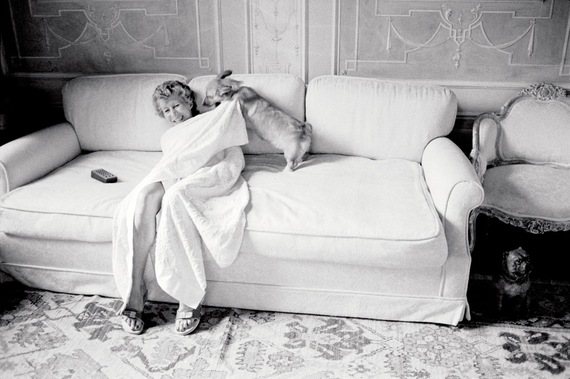It's a new year, and I am getting older. On the one hand, duh. On the other, I rarely find myself aware that time is actually passing as it happens. I am much more likely to notice it's passage through the poignant and unreliable lens of retrospect. But perhaps because my youngest daughter was just accepted to college, I spent the holiday acutely aware of the fact that the mothering era of my life, all 26 years of it, is coming to an end. Obviously, I've felt this before. I have already lived through two high school and college graduations, and summers have gradually been winnowed down to a few weekends thanks to sports camps, internships and boyfriends. In fact, Christmas vacation has transformed from two weeks to four days, as my elder two daughters returned to work on the 27th. But here's the thing: For the first time, saying goodbye to those years doesn't fill me with terror or dread. In fact, it almost feels okay.
I remember looking forward to getting older when I was a child. I wanted to be a teenager, and then as a teenager, I desperately wanted to be an adult. When I had young children, I spent several years in blissful ignorance, looking forward to them getting older. Then, of course, I realized that they actually would, and I wanted to stop time altogether.
I never expected this phase, when the thought of aging conjured only feelings of loss and nostalgia, to pass. But, rather suddenly, something has inexplicably shifted. I feel like looking ahead these days, not behind. Getting older seems at least as much about possibility as loss.
How did this happen? Honestly, I haven't the slightest idea. Perhaps it's not sudden at all, but the end product of a gradual process, and it's only now that I've noticed. I got older, and it got better. This transition is what Jonathan Rauch describes in his analysis of the U-curve of happiness. Researchers about "happiness economics" have discovered a surprising pattern in countries around the world. In adulthood, life dissatisfaction declines with age, bottoming out in the late 40's and early 50's (the nadir, on average at 46). Then, until the very last years of one's life, it increases with age, often reaching a level higher than in young adulthood. This pattern has become known as the happiness U-curve.
When Rauch described his own experience with the U-curve, he quoted his friend, Donald Ritchie, who told him, "Mid-life crisis begins somewhere in your 40's, when you look at your life and think, Is this all? And it ends about 10 years later, when you look at your life and think, Actually, this is pretty good." Most interestingly, key to this transition is the return of gratitude.
This really caught my attention, because I realized that it is exactly how I feel. And it speaks to one of the aging tensions I feel most -- guilt for being unhappy with any aspect of my enormously blessed life. To my infinite relief, I must be on the other side of the mid-life crisis, and I didn't have to do anything except get older. I have to say, I can't tell you how thankful I am to feel grateful again. I missed it, and it argues well for the decades ahead. In my case at least, I feel gratitude when I am largely happy and satisfied and look forward to the future.
When I think of my clinical work with older parents, I wonder how many of them would express the same feeling if I asked. Interestingly, what they do describe is the return of "creativity," "spontaneity," or "adventure" in their lives, now that the years of intensive childrearing have passed. Two things stand out to me as I hear these descriptors. One, these are not words that one typically associates with the process of aging. And two, none of these feelings, "creativity," "spontaneity" or "adventure," exist without hope, a state that fundamentally depends, at least in my view, upon gratitude.
There is a lot of new research out there that supports my patients' descriptions of getting older, debunking the myth that decline and dissatisfaction are inevitable by-products of the aging process. And evidently, all we have to do to accomplish a happier old age is just get older. As Rauch said, I really wish someone had told me this a little earlier. Like, say, in my forties.
So for those of you still there, Happy New Year!
